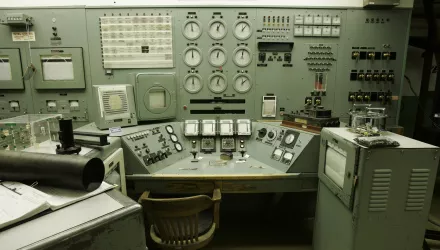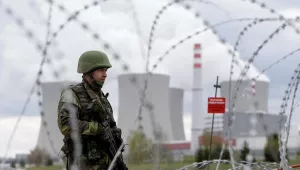Fifty years ago this week, President Eisenhower delivered the "Atoms for Peace" speech before the United Nations. It was one of the defining moments of the nuclear age.
At the time, the United States was in a familiar position, waging a struggle against a violent ideology (communism, not Islamism), and contending with crises in North Korea and Iran. Five decades later, it makes sense to ask what, if any, lessons Bush could draw from Eisenhower.
The speech had two themes:
Atomic weapons pose a terrible danger to the international community."Let no one think," said Eisenhower, "that the expenditure of vast sums for weapons and systems of defense can guarantee absolute safety.... The awful arithmetic of the atomic bomb does not permit any such easy solution."
The United States had to convince governments that there was some benefit to nuclear restraint.These countries would have to be persuaded even as the world's great powers were building their own nuclear weapons. Eisenhower proposed that the United States share the benefits of nuclear science - energy, medical isotopes, and the like - with countries that chose peaceful rather than military applications of the atom. This idea was later incorporated into the Nuclear Nonproliferation Treaty (NPT).
Fifty years later, critics are arguing that the nonproliferation regime is broken. In Washington, the emphasis is on denial and coercion, not benefits and bargaining.
The record suggests, however, that if anything, Eisenhower's ideas have accomplished more than even its advocates had hoped. Take for example, the International Atomic Energy Agency (IAEA), first proposed in the "Atoms for Peace" speech. IAEA inspectors have given the world vital information on the nuclear ambitions of North Korea, Iraq, and Iran.
And nuclear restraint has been far more effective than anyone imagined. Contrary to virtually every prediction, nuclear weapons have not spread widely. Since the nuclear age began, some 34 nations have been interested in acquiring nuclear weapons, but the overwhelming majority gave up that ambition. The success in preventing widespread proliferation is arguably the greatest and least recognized public policy achievement of the 20th century. To be sure, the system is not without shortcomings, but the overall record is one of stunning success. One can only imagine what the world would have been like without the IAEA, the NPT, and similar efforts.
But what about the next 50 years? Serious challenges lie ahead, one of which is especially daunting. Under the current system, any nation has the right to build its own uranium enrichment or spent-fuel reprocessing plants. Enrichment and reprocessing are among the few nuclear technologies that provide a direct bridge to nuclear weapons. The head of the IAEA has proposed that all future enrichment and reprocessing should be placed under international control. Clearly, something must be done.
Washington's response has been to threaten some of the nations (e.g., Iran) that seek enrichment or reprocessing, while ignoring the ambition of others (Brazil) and refusing to talk about countries that already are doing it (France and Japan). This strategy is unlikely to work.
Eisenhower understood that bullying nations is a limited and shortsighted policy. Not to say that coercion is without merits. Ultimately, however, nations have to see the benefits of restraint, or they will go their own way. This was Eisenhower's insight. In his speech he acknowledged that it is not enough merely "to present strength." Security would come only if governments found that their national interests were best served by rejecting the bomb.
The regime Eisenhower and his successors built is not perfect, but President Bush would do well to build on its principles and aspirations, particularly in dealing with Iran and North Korea. The regime will have to evolve if it is to meet the challenges of the next 50 years, but we will accomplish little without recognizing its essential wisdom.
James Walsh is executive director of Managing the Atom, a program at the Belfer Center for Science and International Affairs, John F. Kennedy School of Government, Harvard University.
Walsh, James. “Nonproliferation, Persuasion and Peace.” Philadelphia Inquirer, December 12, 2003




